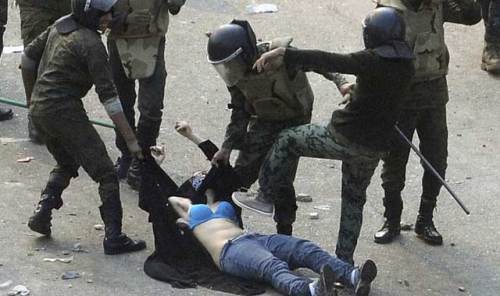
Spending the week before Christmas in Cairo was a stark reminder that the Egyptian Revolution is far from being over. I travelled to Egypt on Saturday December 17, the second day of recent clashes between activists and the army. The atmosphere was odd. A mixture of life carrying on and whispering tensions. A blend of apathy and looming spectres.
Despite travelling to a place which TV footage shows to be an unpredictable pseudo-warzone, it hit me that most of Cairo just gets on with its own business. Being glued to international coverage can subconsciously start to build an image of Tahrir as representing Cairo. The whirlpool of the Square which engulfs our TV screens paints a picture of grassroots sentiment which isn't representative. Tahrir is just an isolated area of active resistance in a bustling city which (unfortunately) doesn't pay it the same respect it did in the January uprising.
The iconic image of the beaten lady in the blue bra was released whilst I was there. Her black cloak violently pulled over her head revealed a half-naked body which was mercilessly stomped on by the military police. My disgust was absolute but local sentiments are surprisingly split, according to the Egyptian journalists I spoke to.

Manal Abdul Aziz Ali is Associate Chief Editor of the Egyptian Gazette, the Middle East's oldest English-language newspaper. "I'm not surprised", she says, referring to the army's latest tactics. "Men have been handicapped with their eyes shot out on purpose" -- so such brutality is not new in her mind. But many others don't believe that the army could do such a thing.
"The army has a special place in the hearts of the people. 1973 and January 25 saw the victory of the army protecting the people. They are heroes for Egyptians".
Some people see the picture as a forgery and propaganda against the army. In similar vein there are rumours that the women suing against rape are fabricating the story.
Lina Attalah, Managing Editor of Egypt's most influential newspaper, Al-Masry Al-Youm, also takes the view that the women of the revolution have been demonised. She has overheard people asking why the lady in the blue bra was not wearing anything else under her abaya (black outer garment). The irony leaves me speechless. In any case they fault her for being there in the first place.
The demonization of women is compounded by the army's robust propaganda campaign to present itself as the real protector of the nation. Activists are painted as trouble makers. Last Friday saw thousands demonstrate in a day of 'regaining honour' particularly for women, but only a day before I saw a newspaper sporting the front-page headline, 'A plot for burning Egypt'.
Tahrir can be seen as a Republic -- a sub-state in Cairo epitomising the revolution. But outside of its borders, the vying narratives and propaganda wars make it hard for the ordinary Egyptian to navigate the political scene. Tahrir is a vital whirlpool of activism but perhaps also an echo-chamber of its own perspectives.
"A lot of people who partook in protests in January are back home now", Lina explains. "They think protests are actually hurting the cause. At this point there is this striving for stability. Those who remain in Tahrir are radical activists, alongside lower class activists who think only the street can reclaim their demands for better lives -- this is the aspect of the revolution being about social justice."
She muses that the social psychology of the square has become less gentrified, with an element of some people feeling "I can risk my life anyway because it's worthless".
Women have been vital to the whirlpool of political activism but their presence has also been targeted -- both physically and in discourses surrounding morality. The recent cries of "women are the red line!" vent only a morsel of the anger felt by activists.
Lina points out that "there is a misconception about the fact that perhaps being a woman will spare you from being harassed. That hasn't been considered at all. Women have been equally humiliated." She ironically concludes, "It's a great moment of equality."
Following the incident of the lady in the blue bra there has been a resounding silence from the Islamists, revealing a more complex political reality. There is not only an intellectual air to the silence -- one which infers their view towards women -- but a deeper political motive of not wanting to clash with the army. Only the military can grant them organised elections which will pave their way to their forecasted ascent to power. From that perspective, there is no need to speak out -- regardless of the costs.
Manal predicts that this will be the start of a new women's movement in Egypt -- directed at the Islamists.
But no one knows how the political scene will develop. It's clear that Tahrir is no longer attracting enough Egyptians. Nevertheless, as Lina points out, "You go back and remind yourselves that it's only minorities which make revolutions... I refuse to be hopeless. I think hope is resistance in and of itself."
